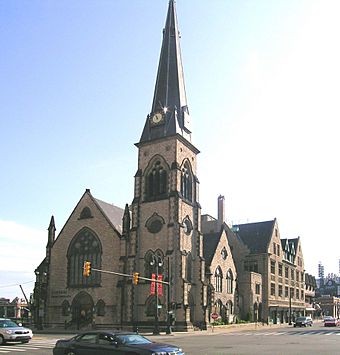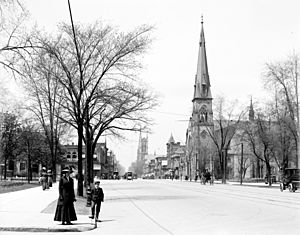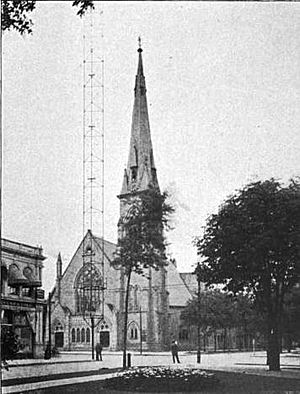Central United Methodist Church (Detroit) facts for kids
|
Central United Methodist Church
|
|
|
U.S. Historic district
Contributing property |
|

Central United Methodist Church from across Woodward
|
|
| Location | 23 East Adams Street Detroit, Michigan |
|---|---|
| Built | 1866 |
| Architect | Gordon W. Lloyd; Smith, Hinchman & Grylls |
| Architectural style | Tudor Revival, Gothic Revival |
| Part of | Grand Circus Park Historic District (ID83000894) |
| MPS | Religious Structures of Woodward Ave. TR |
| NRHP reference No. | 82002895 |
Quick facts for kids Significant dates |
|
| Added to NRHP | August 3, 1982 |
| Designated CP | February 28, 1983 |
The Central United Methodist Church is a historic building in Downtown Detroit, Michigan. It was recognized as a Michigan State Historic Site in 1977. Later, in 1982, it was added to the National Register of Historic Places. This means it's an important place with a lot of history.
Contents
A Church with a Long History
The story of Central United Methodist Church began way back in 1804. That's when the first Methodist preachers, called "circuit riders," visited Detroit. One preacher, Rev. Nathan Bangs, had a tough time. Some young people played pranks on him. After that, no circuit rider came back until 1809.
Starting the First Congregation
In 1809, Rev. William Case arrived. He found it hard to find many religious people in Detroit. But a few wanted to start a church. In 1810, Rev. William Mitchell helped them form the First Methodist Society of Michigan. This made Central the very first organized Protestant church in what was then the Michigan Territory.
Their first church building was a log cabin. It was built in 1818 near the Rouge River. Before that, they met in the territorial council house. The church officially became a legal organization in 1822. In 1826, they built their first church inside Detroit. It was at the corner of Gratiot and Farmer streets. This building was replaced in 1833 and again in 1849.
A Church for Peace and Justice
Central United Methodist Church has always been known for supporting peace and fairness. In 1830, a church member named Sheriff Thomas S. Knapp resigned. He refused to carry out a public hanging. Many people were upset by the hanging. They demanded an end to capital punishment in Michigan. This was the last execution in Michigan. Michigan became the first English-speaking place in the world to stop using the death penalty.
In 1934, Dr. Frederick Bohn Fisher became the pastor. He was a former bishop in India. He was also a personal friend of Mahatma Gandhi, a famous leader for peace. Dr. Fisher even wrote a book about Gandhi.
In 1936, Woodward Avenue was made wider. Part of the church had to be moved to save its steeple. Dr. Fisher helped redesign the inside of the church. He added beautiful wooden carvings and a mural of the 12 apostles. He believed that beautiful churches could help people feel closer to God.
Dr. Henry Hitt Crane was the senior pastor from 1938 to 1958. He believed in peace during both World War I and World War II. He faced challenges for his beliefs. His successor, Dr. James H. Laird, also faced strong opposition for speaking out against the Vietnam War. For many years, Central offered advice to people about the draft.
Supporting Civil Rights and Equality
Central Church became integrated in the 1950s. It was a leader in the civil rights movement. Dr. Martin Luther King, Jr. preached from Central's pulpit many times. His last visit was just two weeks before he passed away.
The church has also been active in working for peace in the world. It is often a meeting place for peace rallies and marches. Central has strongly supported workers' rights. It was even the headquarters for a major newspaper strike in the 1990s. In 2001, Central became a Reconciling Congregation. This means it welcomes all people into its church family. The church supports all its members and works to change policies that cause unfairness.
Helping the Community
Central Church helps run The NOAH Project. This project helps people experiencing homelessness. It offers meals, social services, and job readiness classes. The church building also houses the Swords Into Plowshares Peace Center and Gallery. This gallery focuses on art about peace. The Value Shop, a resale shop, also helps people in Detroit.
Other groups in the church building include the National Welfare Rights Organization. There is also a Library of Black Labor History. Westside Mothers and Moratorium Now are also there. Moratorium Now helps people keep their homes. Central Church celebrated its 200th birthday in 2010. Many special guests, like Rev. Jesse Jackson, Sr., visited that year.
The Church Building's Story

In 1863, a nearby church burned down. The two congregations decided to join together. They chose to build a new church at Woodward and Adams. The first stone for Central Church was laid on July 3, 1866. The original church area included the main church, a chapel, offices, and a house for the pastor. The smaller buildings were taken down in 1916. A new six-story church house was built in their place.
In 1936, Woodward Avenue was made wider. To make space, a 30-foot section of the church was removed. The west wall and steeple were moved 26 feet eastward. This made the church shorter. At the same time, the inside of the church was updated. A new altar area was created. It featured an elevated pulpit and lectern. The main altar has a 30-foot high reredos (a screen behind the altar). These were carved from Appalachian Mountain White Oak by a master wood carver named Alois Lang.
On the arch around the altar, there is a mural of the 12 Apostles. It was painted by Detroit artists Elliott and David Skinner. They were members of the church. Thomas Di Lorenzo painted the ceiling. It has 230 panels with symbols of the Christian church. These symbols came from places like the Temple of Heaven in China and the Sistine Chapel in the Vatican. Beautiful stained glass windows were added in 1956. They were made by the Henry Lee Willett Studios in Philadelphia.
See also
 In Spanish: Iglesia Metodista Unida Central para niños
In Spanish: Iglesia Metodista Unida Central para niños
 | Charles R. Drew |
 | Benjamin Banneker |
 | Jane C. Wright |
 | Roger Arliner Young |


